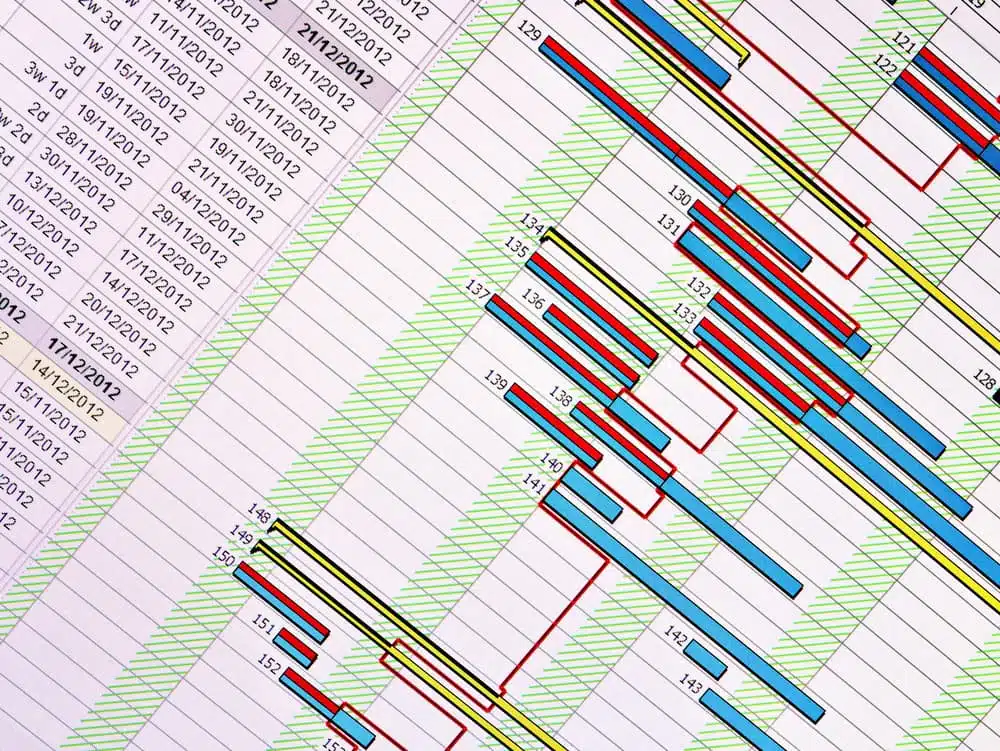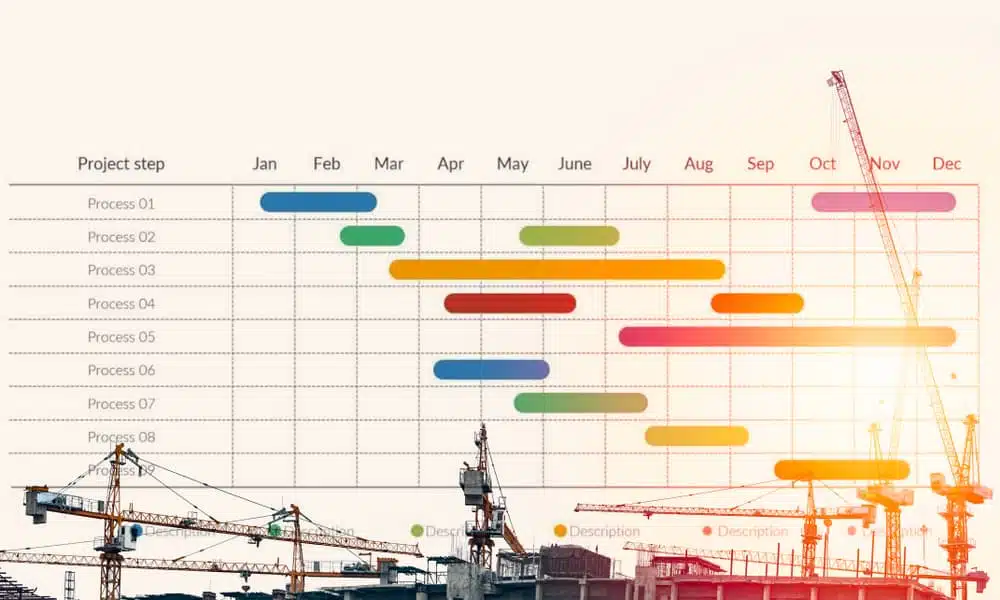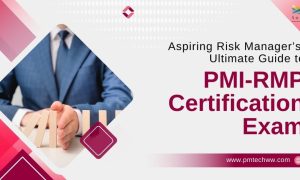Construction program management is the strategic oversight and coordination of multiple construction projects to achieve larger objectives. A construction project manager plays a vital role in overseeing these projects, ensuring alignment with strategic objectives. It’s crucial for efficiently managing complex, large-scale projects, ensuring that all individual projects align with the overall goals. In this article, we will explore key strategies for success, essential phases, best practices, and tools to help you master Construction program management.
Key Takeaways
Construction program management focuses on the simultaneous oversight of multiple projects to achieve broader strategic objectives, differing from traditional project management, which centers on individual projects.
Collaboration among key roles such as program managers, project managers, specialized contractors, and the project team is vital for aligning projects with overall goals and ensuring effective execution within construction programs.
Successful construction program management requires navigating essential phases, including initiation, planning, execution, monitoring and control, and closeout, while employing best practices like clear communication, robust risk management, and financial oversight.
Understanding Construction Program Management

In the field of construction, program management is a distinct and specialized area that deals with simultaneously overseeing multiple construction projects. It diverges from classic project management by taking a holistic view, weaving together various individual endeavors to achieve overarching strategic goals. The pivotal role this discipline plays in the successful delivery of extensive and intricate construction projects cannot be overstated. It demands meticulous attention to the ways these various initiatives interlink and impact one another, which are key determinants in realizing overall objectives.
Consider an urban infrastructure enhancement initiative as an illustration—it could encompass upgrades like repairing roads, constructing bridges, and improving utilities. Each project serves as a piece of a greater whole with shared outcomes. Navigating through these intricacies requires adept handling of their interconnected nature while maintaining consistent focus on broader ambitions.
A project manager oversees individual projects, ensuring they align with the overall program goals by developing project plans, coordinating with stakeholders, managing budgets, and advocating for the owner’s interests throughout the construction process.
The cornerstone aim behind effective program management within construction circles involves reaching targeted strategic endpoints effectively while judiciously marshaling resources alongside prudent risk administration.
Key Roles in Construction Program Management
Within the realm of construction program management, successful collaboration between key personnel is critical. The construction project manager takes a central role by managing multiple projects, overseeing budgets, and coordinating with teams. They are responsible for project execution, ensuring that all deliverables are met according to the project plan, and managing stakeholder relationships. Their primary objective is to ensure that every project remains consistent with larger goals while making pivotal decisions for the benefit of the entire program.
The overarching direction that a program manager provides receives crucial support from project managers. They are tasked with leading individual initiatives within this framework—orchestrating teams meticulously—as well as preparing comprehensive plans and financial forecasts. To maintain adherence to relevant codes and standards throughout these endeavors, they must align each project deliverable under their purview with broader objectives.
Integral too are other roles such as those fulfilled by construction estimators, general contractors, and specialized subcontractors who play essential functions in ensuring seamless execution across all phases of a project, which collectively lead towards accomplishing shared ambitions within any given construction venture.
Essential Phases of Construction Program Management
The administration of a construction program requires proficient steering through five crucial stages: Initiation, Planning, Execution, Monitoring and Control, and closure. These are instrumental during the construction phase to guarantee an organized and effective progression of the project from inception to completion.
It’s important that we examine these phases in detail to grasp their significance as well as the principal tasks associated with each stage.
Initiation Phase
The initiation phase, a crucial stage that entails laying solid foundations for success, marks the start of the construction program. In this initial step, setting clear objectives and goals aligned with overarching strategic aims is imperative to ensure every project within the program contributes significantly toward achieving a broader vision. Identifying stakeholders is also essential during this period. It involves recognizing all parties involved, including clients, project teams, contractors, and community members, so their needs and expectations can be considered.
Assembling the project team during the initiation phase is crucial to ensuring clear communication and collaboration among team members.
To ascertain whether each element of the projects stands up to scrutiny in terms of finances, technology capabilities, and logistics practicality, a feasibility study becomes necessary at this juncture. Pinpointing stakeholder prerequisites goes hand in hand with executing these studies as well as crafting a detailed project charter which will navigate the trajectory of the entire program.
Maintaining meticulous attention throughout each aspect of initiating such programs guarantees that they are primed for effective coordination, leading them on a path towards success right from their inception.
Planning Phase
The planning stage is deemed pivotal in construction management, seeing as it entails the formulation of detailed documents that direct the implementation of the project. These critical documents encompass:
an intricate work breakdown structure
a structured communication strategy
a thorough risk management scheme
A project manager plays a crucial role in developing these comprehensive project plans and coordinating with stakeholders to ensure all aspects are effectively managed.
A meticulously prepared project plan serves as navigational guidance, delineating necessary tasks, key milestones, expected outcomes, timeframes involved and resource allocations vital to efficient execution.
In tandem with this process are efforts towards constructing risk management plans crafted to pinpoint prospective challenges while articulating strategies for their preemption. Tools such as the critical path method come into play here for crafting optimal schedules that assist not only in recognizing risks but also in predicting cash flows and appraising resources required.
Scheduling software becomes integral by fostering precise sharing of information among all parties concerned, thus bolstering effective oversight over all aspects of managing the undertaking.
Ensuring each party understands their roles and interdependencies within the project crystallizes expectations about deadlines — central to keeping on track with timelines set forth at inception. By amassing relevant documentation cohesively in one place, it simplifies access to design illustrations while simultaneously providing real-time insights into ongoing advancement—essential ingredients during this careful preparatory phase paving way for synergy amongst stakeholders moving forward into later stages.
Execution Phase
The execution phase marks the critical juncture where plans are put into action. The central aim during this stage is to construct the project while meticulously executing the established project plan with efficiency in mind. The project manager holds a crucial role at this point, overseeing progress, managing resources, and keeping open lines of communication with all involved parties.
Successful resource management calls for acquiring labor and deploying resources according to what has been previously organized, being careful not to stretch team members too thin across multiple tasks. Quick responses to unforeseen shifts are vital in adhering to set timelines and preserving quality standards.
To track advancement effectively requires allocating resources judiciously, enacting project management strategies as designed, and crafting methods that gauge performance accurately. Advanced construction management software plays an indispensable role in managing contracts and financial plans proficiently—ensuring enhanced monitoring capabilities and greater transparency throughout operations.
Ensuring clarity regarding fiscal responsibilities creates a conducive atmosphere for work activities, which substantially contributes towards achieving success within any given project.
Monitoring & Control Phase
The monitoring and control phase is vital for tracking project progress and ensuring that it stays on course. Effective monitoring identifies areas for improvement, measures progress, and ensures project success. This phase involves continuous tracking of both progress and performance against the established plans. Dashboards provide a high-level view of project metrics, keeping teams informed and aligned.
Program managers oversee project performance, identifying potential issues and implementing corrective measures as necessary. When delays occur, it’s critical to understand their impact on the overall project timeline and address them by identifying work that can be done in tandem to make up for lost time.
Risk management is also a key component, helping to manage and mitigate project risks effectively.
Closeout Phase
During the final stages of a construction project, it is essential to address punch list items and carry out the last inspections in order to unlock retainage funds. These funds are critical for maintaining the financial health of the project. Once work has concluded, it’s customary for clients to perform an evaluation at the construction site and put systems and equipment through their paces. Prior to handing over control, there should be a comprehensive walkthrough that guarantees all components satisfy client standards.
To ensure every detail meets expectations during this conclusive review, compiling a punch list while on-site provides documentation that no task has been overlooked or left incomplete. It’s also imperative before departing from the worksite to provide thorough training regarding pertinent systems to both clients and property managers.
Leveraging technology in wrapping up can streamline processes by digitalizing document management, monitoring key elements effortlessly, and enabling on-the-go access via mobile devices. Recording experiences gleaned from current projects into a collaborative software platform is valuable for refining strategies in future endeavors.
Best Practices for Effective Construction Program Management

By embracing top-notch practices in the realm of construction program management, one can guarantee that projects proceed without a hitch and meet their intended goals. Central to these practices are coherent communication, strong risk management strategies, and vigilant financial supervision. This comprehensive approach ensures meticulous coordination and effective handling of all aspects of the project.
Now, let’s delve into an in-depth examination of these exemplary program management best practices.
Clear Communication Channels
Strong communication strategies are the foundation of effective project management in the construction industry. These are fundamental for reaching the objectives set out for any given construction project. Strong leadership and program management skills facilitate smooth exchanges between all parties involved, aligning various teams’ efforts with expected outcomes and maintaining harmony throughout the process. Program managers must craft straightforward, direct communication plans that guarantee stakeholders receive crucial information without delay.
Clear communication channels within the project team are crucial to ensuring alignment and effective collaboration.
The integration of specialized tools designed for managing construction projects can significantly boost communications efficiency by handling emails, site imagery, budgeting details, timelines, and employee timesheets systematically. Platforms such as Procore and Workyard offer unified solutions to enable synchronous update sharing—improving knowledge accessibility among team members.
It’s essential to establish a well-defined communication plan that outlines protocols for disseminating updates regarding the progress of a construction project. This ensures that every stakeholder remains consistently informed about developments across all levels of execution, maintaining everyone within close collaborative coordination (on “the same page”).
Robust Risk Management
Proactive risk management is essential for navigating potential challenges in construction projects. Identifying and mitigating risks can significantly improve project outcomes by reducing disruptions. Program managers have the ability to use risk management software. This software helps them capture and analyze risk data, track mitigation actions, and generate reports.
Effective risk management involves developing contingency plans for potential risks to minimize disruption. Common strategies include risk avoidance, transfer, reduction, or acceptance. Continuously monitoring risks and updating plans as necessary ensures that projects remain on track despite uncertainties.
Financial Oversight
To avoid exceeding the budget and maintain projects within established monetary boundaries, it is essential to practice careful financial oversight. From the outset of a project, it’s necessary to employ cost control strategies and monitor expenditures closely in order to reduce fiscal uncertainties. Program managers play an important role by discovering opportunities for reducing costs and consistently providing stakeholders with detailed reports that highlight spending patterns and deviations from the initial budget.
For those holding stakes in a project, having access to straightforward financial information is vital. Such transparency empowers them with the knowledge needed for sound decision-making processes while also helping ensure the ongoing viability of programs. Leveraging construction program management software equipped with capabilities for budgeting, projecting expenses, and managing cost controls can substantially enhance efficient economic stewardship over projects.
Stakeholder Management
Stakeholder management is a crucial aspect of construction project management. It involves identifying, engaging, and effectively communicating with various stakeholders throughout the project lifecycle. Stakeholders can include project owners, architects, engineers, contractors, subcontractors, suppliers, and regulatory authorities.
Effective stakeholder management is essential to ensure that all stakeholders are informed, engaged, and aligned with the project’s goals and objectives. This can be achieved through regular communication, stakeholder analysis, and issue management.
Construction project managers must identify and prioritize stakeholders based on their level of influence and interest in the project. They must also develop a stakeholder engagement plan that outlines the communication strategy, frequency, and content.
Some common stakeholder management tools and techniques used in construction project management include:
Stakeholder Analysis and Mapping: Identifying stakeholders and assessing their influence and interest in the project.
Communication Plans and Protocols: Establishing clear communication channels and protocols to ensure timely and effective information sharing.
Issue Management and Resolution: Proactively addressing and resolving issues that may arise during the project.
Regular Progress Updates and Reporting: Keeping stakeholders informed about the project’s progress through regular updates and reports.
Stakeholder Engagement and Feedback Mechanisms: Encouraging stakeholder participation and feedback to ensure their needs and expectations are met.
By effectively managing stakeholders, construction project managers can ensure that all parties are working together towards a common goal and that the project is delivered on time, within budget, and to the required quality standards.
Construction Project Delivery Methods
Construction project delivery methods refer to the various approaches used to plan, design, and construct a project. The choice of delivery method depends on the project’s complexity, size, and requirements.
Some common construction project delivery methods include:
Design-Bid-Build (DBB): A traditional method where the project is designed first, then bid on by contractors, and finally built.
Design-Build (DB): A method where a single entity is responsible for both the design and construction of the project, promoting collaboration and efficiency.
Construction Management At-Risk (CMAR): A method where the construction manager is involved early in the project and assumes the risk of cost overruns.
Integrated Project Delivery (IPD): A collaborative approach that integrates all stakeholders early in the project to optimize results and reduce waste.
Each delivery method has its advantages and disadvantages, and the choice of method depends on the project’s specific needs and requirements. Understanding these methods allows construction managers to select the most appropriate approach for their projects, ensuring efficient and effective project delivery.
Construction Management At-Risk Delivery Method
Construction Management At-Risk (CMAR) is a delivery method where the construction manager is responsible for managing the construction process and assumes the risk of cost overruns.
In CMAR, the construction manager is hired by the project owner to manage the construction process and is responsible for ensuring that the project is completed on time, within budget, and to the required quality standards.
The advantages of CMAR include:
Improved Project Control and Management: The construction manager’s involvement from the early stages ensures better control over the project.
Enhanced Communication and Collaboration: Close collaboration between the construction manager, project owner, and other stakeholders leads to better outcomes.
Increased flexibility and adaptability: The construction manager can make adjustments as needed to address unforeseen issues.
Reduced Risk of Cost Overruns: The construction manager assumes the risk of cost overruns, providing an incentive to manage costs effectively.
However, CMAR also has some disadvantages, including:
Higher upfront costs: The involvement of a construction manager from the beginning can increase initial costs.
Increased Complexity and Administrative Burden: Managing the construction process and assuming risk add complexity.
Potential for Conflicts of Interest: The construction manager’s dual role as manager and risk-bearer can lead to conflicts of interest with the project owner.
Contract & Design Models for Construction Projects
Contract and design models for construction projects refer to the various approaches used to structure and manage the contractual relationships between stakeholders.
Some common contract and design models used in construction projects include:
Lump Sum Contracts: A fixed price is agreed upon for the entire project, providing cost certainty but less flexibility.
Guaranteed Maximum Price (GMP) Contracts: The contractor is compensated for actual costs incurred up to a maximum price, with any savings shared between the contractor and owner.
Cost-Plus Contracts: The contractor is paid for all project costs plus a fee, offering flexibility but less cost certainty.
Unit Price Contracts: Payment is based on the quantity of work performed, suitable for projects with well-defined units of work.
Time and Materials Contracts: The contractor is paid for the time spent and materials used, providing flexibility but requiring close monitoring.
Each contract and design model has its advantages and disadvantages, and the choice of model depends on the project’s specific needs and requirements. Selecting the right model is crucial for managing risks, costs, and timelines effectively.
Tools & Software for Construction Program Management

Efficient management of construction projects necessitates the incorporation of several tools and software solutions that optimize daily tasks and improve communication channels. Software designed for construction program management acts as a comprehensive repository for handling information pertinent to the program and facilitates automated processes.
Now, let’s delve into some pivotal tools and software that are instrumental in assisting with the management of construction programs.
Construction Project Management Software
Dedicated construction project management software automates timetable adjustments and improves stakeholder collaboration. Tools like Buildertrend allow communication with subcontractors, real-time status updates, proposal creation, and schedule management, all of which are crucial for keeping projects on track. Mobile apps for real-time updates enable effective information access away from the desk, reducing delays and errors.
Procurement software combats rogue spending, updates budgets for unexpected costs, and improves job costing accuracy. Cloud-based document management systems minimize delays and errors during project closeout, ensuring that all necessary documentation is easily accessible.
Scheduling Tools
Project managers rely heavily on robust scheduling tools to manage and coordinate various projects effectively, ensuring that all tasks are completed as planned. These tools offer a structured approach for outlining and monitoring the timelines of projects, enabling project managers to track progress meticulously and make necessary adjustments in real time. Such proactive management is crucial for meeting deadlines consistently, which bolsters the successful execution of construction programs.
Efficient management of timelines and dependencies through these scheduling instruments plays a pivotal role in the triumph of any given project. They are vital assets for those in charge of overseeing multiple ventures who aim to enhance resource utilization while maintaining strict adherence to the projected schedule.
Collaboration Platforms
Platforms designed for collaboration can significantly boost efficiency by enabling uninterrupted communication and the exchange of documents among team members. Their primary functionalities encompass:
Communication through messages
Sharing of documents
Allocation of tasks
Updates in real-time
Take Procore as an example. It provides capabilities that allow for document editing in real time, which enhances cooperation between team members.
Such platforms play a crucial role in ensuring all project stakeholders are privy to up-to-date information, thereby fostering effective collaboration, which contributes to more efficient project execution and increases the likelihood of success. When construction teams incorporate these tools into their workflow, they often experience marked improvements in both productivity and efficacy.
Sustainable Building Practices
Sustainable building practices refer to the use of environmentally friendly and socially responsible practices in the design, construction, and operation of buildings.
Sustainable building practices can include:
Using energy-efficient systems and materials: Implementing systems and materials that reduce energy consumption.
Reducing Water Consumption and Waste: Incorporating water-saving fixtures and waste reduction strategies.
Incorporating Renewable Energy Sources: Utilizing solar, wind, or other renewable energy sources.
Using Sustainable and Locally Sourced Materials: Choosing materials that are sustainable and sourced locally to reduce environmental impact.
Implementing Recycling and Waste Reduction Programs: Establishing programs to recycle materials and reduce waste during construction.
Sustainable building practices can provide numerous benefits, including:
Reduced Environmental Impact: Minimizing the negative effects on the environment.
Improved indoor air quality and occupant health: creating healthier living and working environments.
Increased Energy Efficiency and Cost Savings: Lowering energy consumption and operational costs.
Enhanced brand reputation and social responsibility: demonstrating a commitment to sustainability and social responsibility.
How to Manage Sustainable Building Projects
Managing sustainable building projects requires a comprehensive approach that incorporates sustainable practices throughout the project lifecycle.
Some key steps to manage sustainable building projects include:
Conducting a sustainability assessment and setting sustainability goals: evaluating the project’s sustainability potential and setting clear goals.
Developing a Sustainability Plan and Incorporating Sustainable Practices into the Project Design and Construction: Creating a detailed plan that integrates sustainable practices.
Selecting Sustainable Materials and Products: Choosing materials and products that meet sustainability criteria.
Implementing Energy-Efficient Systems and Renewable Energy Sources: installing systems that reduce energy consumption and utilize renewable energy.
Monitoring and Evaluating Sustainability Performance Throughout the Project Lifecycle: continuously assessing the project’s sustainability performance and making necessary adjustments.
By incorporating sustainable building practices into construction projects, project managers can reduce the environmental impact of the project, improve indoor air quality and occupant health, and enhance the project’s social responsibility and brand reputation.
Case Studies of Successful Construction Programs

Effective program management in construction has repeatedly demonstrated its capacity to fundamentally enhance project outcomes. In many successful examples, the authority for making critical decisions is often vested in the hands of a program manager. Centralized control under this figure allows for greater alignment between individual projects and overarching program goals, ensuring consistent coherence and efficiency throughout all components of the program.
Consider a major urban renewal initiative steered by an adept program manager. This individual managed to synchronize efforts across numerous endeavors, including erecting residential units, developing commercial venues, and enhancing public infrastructure. The strategic choices made by the program manager ensured that elements such as resource allocation, risk mitigation strategies, and communications with stakeholders were effectively harmonized, culminating in projects delivered on time without exceeding budgets.
These exemplary cases highlight invaluable insights into how pivotal robust practice of managing programs can be when it comes to realizing project objectives successfully.
Common Challenges in Construction Program Management
Navigating the complexities of program management in the construction industry is a demanding endeavor. A prevalent difficulty lies in establishing clear and common goals, which, if lacking, can lead to disconnects between stakeholders and project teams. Given the significant dangers inherent to this field, it’s imperative that effective risk management strategies are implemented to prioritize safety and prevent mishaps on-site.
Cost overruns pose an additional challenge within these projects, making it essential for managers to maintain realistic budget expectations while diligently tracking expenditures. The importance of time management cannot be overstated. Scheduling setbacks often escalate into delays or inflate costs further. Pressure from clients and stakeholders with unrealistic hopes can also obstruct steady progress on projects and could negatively affect team spirit.
By employing diligent oversight practices, potential pitfalls can be anticipated and addressed promptly by those managing programs, thus facilitating a smoother path throughout project execution.
The Future of Construction Program Management

Emerging technologies and sustainability practices are set to profoundly influence the trajectory of construction program management. By keeping abreast of contemporary trends and technological advancements, those managing construction programs can achieve elevated levels of efficiency while also enhancing cost-effectiveness. Technologies such as artificial intelligence (AI), virtual reality (VR), and robotics stand at the forefront, poised to significantly boost operational efficacy while simultaneously reducing expenses.
Incorporating sustainable approaches into construction management is increasingly becoming a pivotal component, focusing on eco-friendly practices alongside energy-saving systems. Employing sustainable strategies will not only ensure adherence to environmental regulations but will also enhance the desirableness of construction projects in terms of their ecological footprint.
On the cusp of a transformative era, the construction industry anticipates an impending tech-centric upheaval that will overhaul traditional project management and execution methodologies.
Summary
In the construction industry, mastering program management is integral to project success and requires a thorough grasp of its fundamental phases from initiation to closeout. Each phase is instrumental in aligning projects with overarching goals while ensuring timely completion within budget constraints. Key practices such as clear communication, effective risk management, and diligent financial control are crucial for achieving favorable results.
As advancements transform the field of construction, adopting innovative technologies alongside sustainable methods becomes increasingly important for maintaining competitiveness and enhancing efficiency. Construction professionals who employ these cutting-edge strategies along with sophisticated tools can expertly handle complex aspects of program management, leading to exemplary performance outcomes. At PMtech Digital Solutions, those prepared to innovate and adjust their approach, future opportunities abound in shaping successful ventures within this ever-changing sector.
Frequently Asked Questions
What is the difference between construction program management and project management?
The primary distinction is rooted in the breadth of their focus. While project management pertains to the overseeing and completion of an individual project, construction program management involves coordinating several interconnected projects with the intent to achieve broader strategic objectives. Recognizing this difference is crucial for grasping their unique functions within the realm of the construction industry.
What are the key roles in construction program management?
Key roles in construction program management include program managers, project managers, construction estimators, general contractors, and subcontractors, all of whom are essential for effective project execution. Each role plays a distinct part in ensuring the success of the construction program.
What are the essential phases of construction program management?
Construction program management is comprised of fundamental stages that include initiation, planning, execution, monitoring and control, and closure to guarantee a systematic and efficient evolution of the project from start to finish throughout its lifecycle.
How important is risk management in construction program management?
Risk management is essential in construction program management as it identifies potential challenges and develops strategies for mitigation, thereby ensuring project success and minimizing disruptions. Proper risk management safeguards the integrity and timeliness of construction projects.
What tools and software are beneficial for construction program management?
Utilizing project management software, scheduling tools, and collaboration platforms is essential for enhancing communication and streamlining operations in construction program management. These tools significantly improve overall project management efficiency.




